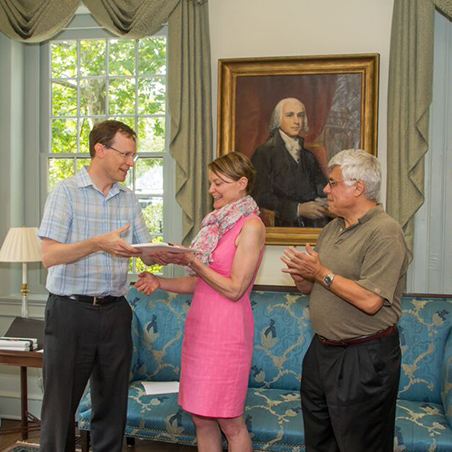John S. Weeren
Founding Director of Princeton Writes
Bachelor of Arts (Hons.), 1985
If you care deeply enough about the field you want to venture into ... you will end up in a place you want to be.
John Weeren finished Foundation Year Program (FYP) in 1982, yet still spends his days on a campus that reminds people of Hogwarts. But it’s not King’s. It’s Princeton.
As an undergraduate student, Weeren’s first encounter with collegiate life was at Prince Hall, where students could sit and discuss their readings, from Dante to Marx, over a weekly formal meal. His experience at King’s fostered a love of excellent writing and academic community that would take him far in his career.
“King’s was a wonderful oasis on Dalhousie’s campus,” he says. “The president at the time, John Godfrey, really relished traditions–formal meal, sherry in the president’s lodge. It was a very different experience.”
After graduating with the Governor General’s Medal for academic excellence, Weeren completed an MA in history at the University of British Columbia. “I was on a track to get a PhD, find a university position somewhere,” he remembers.
However, Weeren realized that he was more interested in “working with the raw materials of history” and turned towards archival work. Although he originally decided against pursuing a career in academia, Weeren ultimately became an archivist at the Seeley G. Mudd Manuscript Library at Princeton. And thus began a long association with the University.
It was his devotion to good writing that ultimately led Weeren to his current work. During a nine-year stint as speechwriter for University President Shirley Tilghman, Weeren noticed that there was a pressing need for practical writing skill development among Princeton’s employees.
He decided to initiate a workshop called “Write or Wrong,” which aimed to fill the gaps in professional writing skills left by academic training. The workshop was immensely popular, and Weeren soon turned it into a full-fledged and, to the best of his knowledge, one-of-a-kind program, Princeton Writes.
“I never set out to be a writer or a teacher, but fate kept pushing,” he says. “If you care deeply enough about the field you want to venture into, even if the road is not direct, you will end up in a place you want to be.”
Indeed, under his direction, Princeton Writes has grown steadily since its creation in 2013. “I do a bit of everything, as it’s just my assistant director and I, though we often enlist others to do workshops in their areas of expertise.” The program now offers one-on-one coaching, workshops, and other activities for employees and students, from symposia to public speaking groups to essay contests.
“The goal of the program,” Weeren explains, “is to create a space for anyone to turn to for practical communications help. There are resources for academic writing but little to assist employees and students in navigating non-academic contexts–such as crafting a compelling email.”
He is also helping Princetonians enhance their verbal fluency, from pitching ideas to preparing for interviews. Most recently, the program launched the International Coffee Break, a forum for international employees to work on their English. Weeren also spearheaded a series of dinner conversations with distinguished faculty called Tell Me More, designed to help graduate students discuss their research in more accessible terms.
Weeren is hoping to spread his message beyond Princeton: he is currently working on a book about effective administrative writing in academia for University employees everywhere. “There are many people in college and university administration who write an enormous amount, but they don’t necessarily get the support or recognition they deserve.” Weeren aims to change that.
Updated: January 2021
